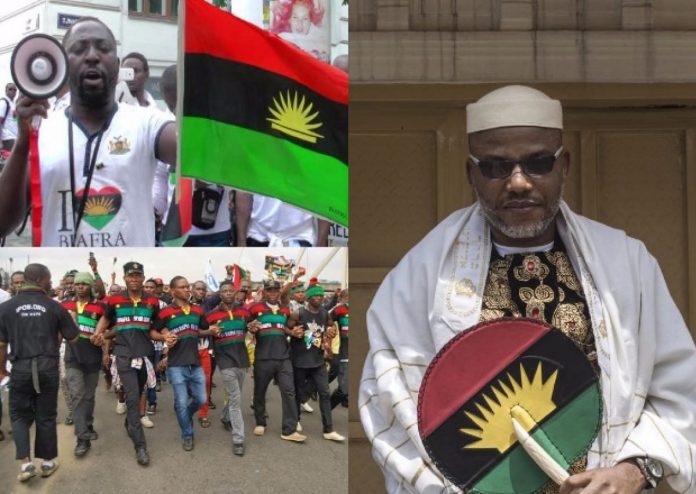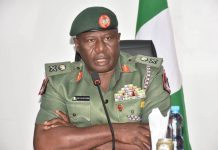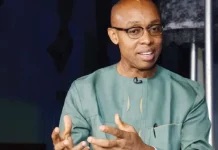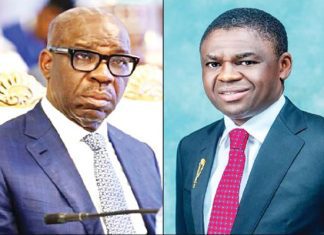Nigeria is in a state of undeclared battle with itself. Probably the most populous Black nation on earth is combating on totally different fronts. From the Boko Haram insurgency to the scourge of marauding killer Fulani herdsmen and the militant actions of the avengers within the Niger Delta, clearly, all shouldn’t be well with Nigeria. The widespread denominator of all these groups is separatism caused, not solely by the structure of the Nigerian state however in its operation by the political management. The longest-operating separatist agitation is the Biafra aspiration amongst Nigeria’s Igbo ethnic group.
The Biafran battle has resurfaced within the type of the Indigenous Individuals of Biafra (IPOB), a separatist group led by Nnamdi Kanu. The Biafra spirit is as alive at present because it was in 1967 as a result of Nigeria is as divided as we speak as was then. The Igbo ethnic group, one of many largest in Nigeria, with over forty million people, is probably the most marginalized and politically deprived. The marginalization of the Igbo is systematic and much-reaching.
Read also: Scores of bandits meet waterloo as troops intensify clearance operations, recover cache of arms in Katsina State (Graphic Images)
Modern Nigeria is a British colonial legacy. The 18th Century was the age of European exploration of sub-Saharan Africa, following the industrial revolution and the declining Slave Trade, to determine the feasibility of legitimate trade in the interior of the continent. In the preceding era of the Trans-Atlantic Slave Trade, European merchants had limited knowledge of the interior of sub-Saharan Africa, as trade was conducted on the coast with local businessmen serving as middlemen between them and chieftains of slave raiding chiefdoms. Following the amalgamation of the various kingdoms, chiefdoms, and peoples of Nigeria in 1914, by the colonial governor of the territory formerly known as the Niger Area, Lord Frederick Lugard, Nigeria’s journey to nationhood began. The various peoples who suddenly found themselves under a common umbrella accepted their new status with mixed feelings and reservations, with each group seeking a better deal within the constitutional framework of the new nation.
One group of people who embraced the modern state of Nigeria without reservations was the Igbo. The pre-colonial egalitarian socio-political system of the Igbo was consistent with the concept of modern constitutional democracy. The independent spirit and unbridled republican nature of pre-colonial Igbo society, where feudalism and serfdom were almost absent, entirely fostered in them the spirit of competition, culture of hard work, and a societal reward system that was based largely on merit. Coming from this background, the Igbo saw an opportunity in the prospect of a modern state to unleash their energy and enterprise. Equipped with western education, the Igbo moved freely around Nigeria and made a home out of every part of Nigeria. They made a success of their enterprise with huge financial profits, which readily distinguished them in their host communities.
Read also: We are well catered for, ready to return to battle front – Wounded soldiers
Their success sometimes made them boisterous, with a high sense of self-worth, which, unfortunately, was mirrored as arrogance to other ethnic groups. The rest of Nigeria began to view the Igbo with suspicion of an intention to dominate everywhere and everything. The resentment became more manifest by the dawn of Independence in 1960.
The struggle for independence was on the strength of pan-Nigerian nationalism as championed by the likes of Herbert Macaulay, H.O. Davies, and Nnamdi Azikiwe. However, independent Nigeria elevated regionalism over nationalism. Therefore, the Igbo were caught in between the ideals of nationalism and the reality of regionalism. Regionalism limited the Igbo economically and politically. The Igbo, who dominated all federal institutions, from the military to the academia and the judiciary, could only be curtailed from dominating other regional institutions by a rigid form of ethno-geographic regionalism. This scenario created tension in the polity.
Issues boiled over by January 1966, when a group of mostly Igbo military officers carried out a coup that clearly targeted the political leaders of northern Nigeria and their allies in the Western Region. The coup was a precursor to the Civil War, following the Biafran separatist movement as a direct result of a bloody counter-coup staged by northern officers, who saw the killing of the military head of state as well as other top officers of Igbo origin.
Read also: Nigeria releases posting for ninety five ambassador-designates
Political power has since been in the hands of serving and retired military elite, of mostly northern origin, who actively participated in the counter-coup of July 1966 and who also subsequently prosecuted the civil war that crushed the Biafra rebellion 30 months later, in 1970.
The resurrection of the spirit of Biafra through IPOB is a consequence of the heightened marginalization of the Igbo ethnic group under the current administration. President Muhammadu Buhari’s political scorched earth policy of “97 per cent and 5 per cent” patronage distribution formula, directly proportional to the percentage of votes cast for him, was made real and the Igbo appear to be punished for freely making a democratic choice as guaranteed by the Constitution.
The Biafra question is beyond Nnamdi Kanu’s IPOB, which is only a symbolic expression of deep dissatisfaction brought about by asystematic injustice on the Igbo. Then ruling military elite ensured the South-East geo-political zone, which is the homeland of the Igbo, had the least number, of states (five) and local governments (95), which translates to less revenue from the Federation Account, fewer representation at the National Assembly, fewer executive positions in all political parties, with the collective consequences of political irrelevance in the national power equation.
Read also: Atiku sends message to new Ohanaeze Ndigbo’s President-General, George Obiozor
This situation is further compounded by the fact that Nigeria exists more for political reasons than economic. Therefore, merit by way of excellence and hard work is not always rewarded. Sectionalism has been entrenched in the system to reward less work, provided you are from the right part of the country. The policy of quota system ensures that standards are lowered to accommodate people from educationally disadvantaged states of northern Nigeria into higher institutions of learning, while the standard is raised for people from educationally advantaged states from mostly the southern part of Nigeria.
Talking about eating your cake and having it, the policy of Federal Character also ensures the North-West, with seven states and 187 local governments, gets a higher quota of federal jobs and appointments, irrespective of their educational disadvantaged status.
This system clearly shuts out the Igbo, limiting their opportunities in a country they call their own. It also appears that the rest of the country is unanimous in their opposition to the emergence of a Nigerian President of Igbo extraction, as none of the major political parties has a clear agenda for that purpose. Under the current President Buhari administration, no Igbo is trusted enough to be in the kitchen cabinet. The entire top echelons of defence and internal security apparatus are exclusive of the Igbo. Nothing has been done to address the deep-rooted injustice against a significant section of this country. This largely explains the high level of legitimacy Nnamdi Kanu’s IPOB enjoys among the Igbo today, a legitimacy only comparable to the Chukwuemeka Ojukwu-led Biafra Republic. This is because, 51 years after the end of the civil war in 1970, Nigeria appears to be bedevilled by the same issues of nepotism, marginalization, injustice and leadership ineptitude that has rendered some Nigerians outsiders inside their own country and left them feeling less Nigerian than others.
To carry a correct closure to the unhappy chapter of Nigeria’s civil conflict and its horrible memories, there may be an urgency to redress the structural injustice towards the Igbo via a purposeful restructuring process. And to deal with the systemic political exclusion of the South-East from the very best office within the land, the rest of Nigeria might think about putting in movement a deliberate bi-partisan political course of that may outcome within the emergence of a Nigerian president of Igbo extraction in 2023.
Join Television Nigerian Whatsapp Now
Join Television Nigerian Facebook Now
Join Television Nigerian Twitter Now
Join Television Nigerian YouTUbe Now





